Mission in Japan: Asian Rural Institute September 2018
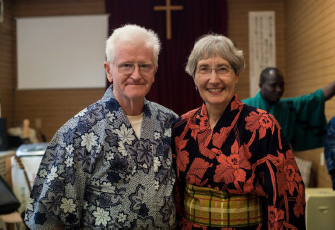 In September, 2018, Asian Rural Institute (ARI) life is as we remembered it from 2013 – welcoming smiles, camaraderie, hard work, learning by doing, and everything that comes with a community sharing a common life together. The special blessing of returning is renewing friendships and also meeting a whole new class of participants and volunteers. We are grateful to Global Ministries, an ARI partner for their support.
In September, 2018, Asian Rural Institute (ARI) life is as we remembered it from 2013 – welcoming smiles, camaraderie, hard work, learning by doing, and everything that comes with a community sharing a common life together. The special blessing of returning is renewing friendships and also meeting a whole new class of participants and volunteers. We are grateful to Global Ministries, an ARI partner for their support.
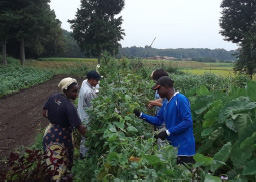 The ARI class of 2018 comes from all over Asia and Africa, even the baby country of East Timor, only 12 years old. These men and women participants from different faith traditions are already rural leaders in their countries. They are here to learn servant leadership skills, community development and to care for the environment by growing vegetables organically rather than with chemicals.
The ARI class of 2018 comes from all over Asia and Africa, even the baby country of East Timor, only 12 years old. These men and women participants from different faith traditions are already rural leaders in their countries. They are here to learn servant leadership skills, community development and to care for the environment by growing vegetables organically rather than with chemicals.
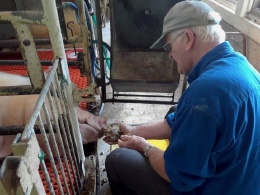 Foodlife is a concept centering on the idea that food means life to us, so all participate in some way with the production of food for an hour twice a day. We were quarantined from the animals to protect them from any foreign viruses for the first week after we arrived, as is everyone. Pigs, chickens, goats and fish are essential to ARI, where 90 % of our food comes from the farm. So Bob began morning and evening Foodlife in the Field section, harvesting and weeding.
Foodlife is a concept centering on the idea that food means life to us, so all participate in some way with the production of food for an hour twice a day. We were quarantined from the animals to protect them from any foreign viruses for the first week after we arrived, as is everyone. Pigs, chickens, goats and fish are essential to ARI, where 90 % of our food comes from the farm. So Bob began morning and evening Foodlife in the Field section, harvesting and weeding.
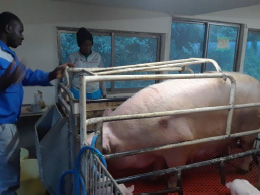 The second week Bob began working in the Pig section. The huge mother sow had been lying down for weeks in a narrow pen while her piglets nursed. She could not stand to eat, so Bob and others had to feed her by hand. This week, while being watered down with a hose, she began to shake and with a big heave, she stood up. Everyone cheered!
The second week Bob began working in the Pig section. The huge mother sow had been lying down for weeks in a narrow pen while her piglets nursed. She could not stand to eat, so Bob and others had to feed her by hand. This week, while being watered down with a hose, she began to shake and with a big heave, she stood up. Everyone cheered!
Joyce’s Foodlife work is meal preparation, called FEAST, 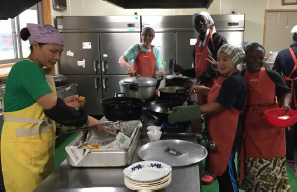 an acronym for Food Education and Sustainable Table. Cooking for 60-70 people involves lots of peeling, chopping, sautéing, and 5 -7 kg of rice at every meal. She helps the team of participants prep their dishes – main course, rice, soup, and side dish for each meal. Leadership is also learned in the kitchen as the participants take turns assigning tasks and assuming responsibility for each meal. Cultural dishes are adapted to whatever vegetables are
an acronym for Food Education and Sustainable Table. Cooking for 60-70 people involves lots of peeling, chopping, sautéing, and 5 -7 kg of rice at every meal. She helps the team of participants prep their dishes – main course, rice, soup, and side dish for each meal. Leadership is also learned in the kitchen as the participants take turns assigning tasks and assuming responsibility for each meal. Cultural dishes are adapted to whatever vegetables are 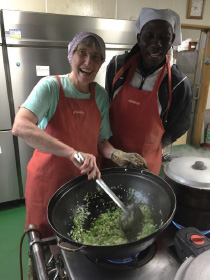 harvested – sometimes a Japanese taste, Indonesian taste or Kenyan taste. We are not eating sushi and sukiyaki! But sometimes we eat miso soup and tempura.
harvested – sometimes a Japanese taste, Indonesian taste or Kenyan taste. We are not eating sushi and sukiyaki! But sometimes we eat miso soup and tempura.
Sometimes the food has been seasoned to what an Indonesian would consider to be very mild, but it is still very hot for an American’s taste buds.
A week after we arrived, the Honorary Director of ARI, the Rev. Dr. Toshihiro Takami, passed away at the age of 91. ARI was Takami sensei’s dream. He planted the seed of ARI in 1973 – the only place in the world where rural leaders could be trained. He was a humble man, inspired by God to become a servant leader for vulnerable 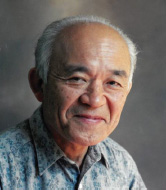 people who depend on the land for survival. At ARI, we become more conscious that even those of us who do not grow most of our own food, also depend on the health of the land for survival.
people who depend on the land for survival. At ARI, we become more conscious that even those of us who do not grow most of our own food, also depend on the health of the land for survival.
Joyce and Robert Ray serve with the Asian Rural Institute (ARI) in Japan. Their appointments are made possible by your gifts to Disciples Mission Fund, Our Church’s Wider Mission, WOC, OGHS, and your special gifts.
